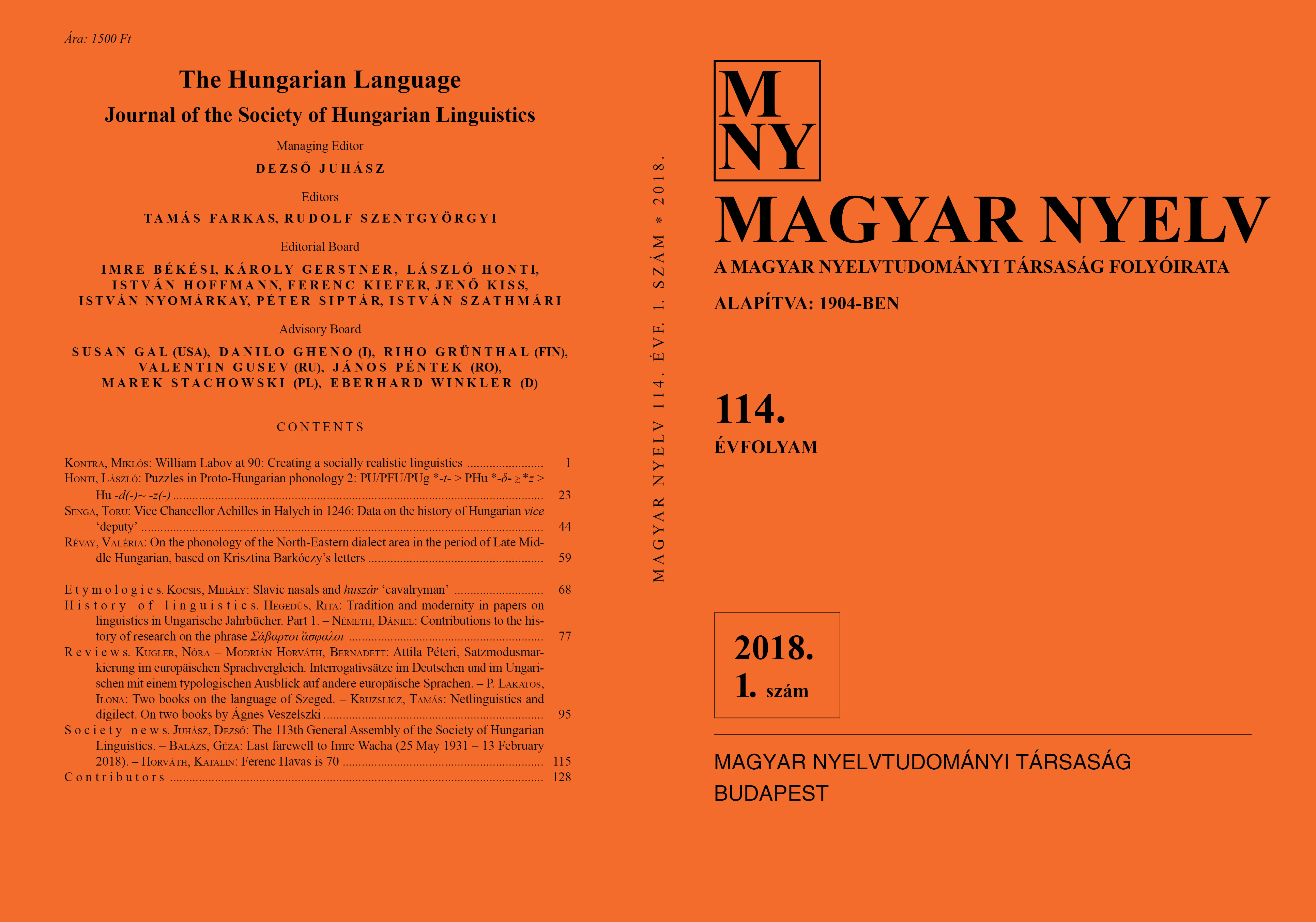Vice Chancellor Achilles in Halych in 1246
Data on the history of Hungarian vice ‘deputy’
DOI:
https://doi.org/10.18349/MagyarNyelv.2018.1.44Keywords:
vice, вицькыи, vicecancellarius, Vice Chancellor Achilles, Metropolitan Cyril, Hungarian–Galician relations in 1246, The Galician-Volhynian ChronicleAbstract
In its 1250 entry, the Galician-Volhynian Chronicle reports that the King of Hungary sent a вицькыи to Danilo, Prince of Halych (Galicia), with the intention of marrying his daughter off to Danilo’s son. Antal Hodinka, who translated the part of text concerned in his bilingual book a century ago, interpreted вицькыи as the “vice” of the Hungarian king. The Hungarian word vice ‘deputy’ is getting obsolete today. Were it the king’s deputy that was meant, it would refer to the Palatine, an official whose roles included standing in for the king in political matters in those days; but as far as diplomacy was concerned, chancellors and vice-chancellors were more entitled to serve those tasks. The present author thinks that some months prior to the marriage taking place in Zólyom (Slovakian: Zvolen) in September 1246, Béla IV may have sent Vice Chancellor Achilles to the Prince of Halych. Achilles also met with Metropolitan Cyril, both in Halych and later in Hungary. The Metropolitan, who was a chancellor of Danilo, and who compiled part of the Chronicle up to 1250 (actually, 1246), noticed that the royal chancery of Hungary was practically directed by the vice chancellor, rather than by the chancellor himself. It appears to be highly probable that it may have been Cyril who revived the word вицькыи on the basis of the noun vice being in use in Béla IV’s court referring to Vice Chancellor Achilles in everyday parlance.
Downloads
Published
Issue
Section
License
Copyright (c) 2024 Toru Senga

This work is licensed under a Creative Commons Attribution-NonCommercial-NoDerivatives 4.0 International License.
Magyar Nyelv is a Diamond Open Access periodical. Documents can be freely downloaded and duplicated in an electronic format, and can be used unchanged and with due reference to the original source. Such use must not serve commercial purposes. In the case of any form of dissemination and use, Hungarian Copyright Act LXXVI/1999 and related laws are to be observed. The electronic version of the journal is subject to the regulations of CC BY-NC-ND (Creative Commons – Attribution-NonCommercial-NoDerivatives).
The journal permits its authors, at no cost and without any temporal limitation, to make pre-print copies of their manuscripts publicly available via email or in their own homepage or that of their institution, or in either closed or free-for-all repositories of their institutions/universities, or other non-profit websites, in the form accepted by the journal editor for publication and even containing amendments on the basis of reviewers’ comments. When the authors publicize their papers in this manner, they have to warn their readers that the manuscript at hand is not the final published version of the work. Once the paper has been published in a printed or online form, the authors are allowed (and advised) to use that (post-print) version for the above purposes. In that case, they have to indicate the exact location and other data of the journal publication. The authors retain the copyright of their papers; however, in the case of an occasional secondary publication, the bibliographical data of the first publication have to be included.



